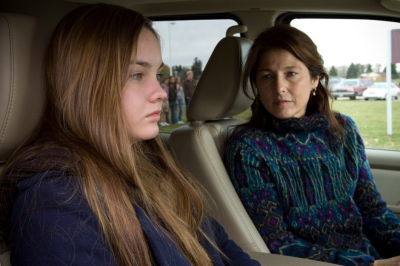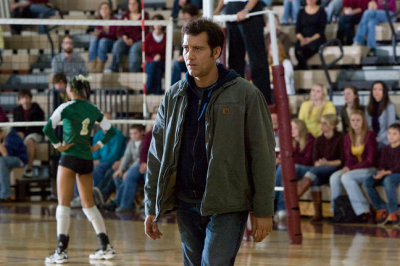By: debbie lynn elias

Trust. By definition, it means (1) “reliance on the integrity, ability, or character of a person or thing”; (2) “custody; care”; (3) “something committed into the care of another”; and (4) “one in which confidence is placed.” All of these may be used to define aspects and meanings of David Schwimmer’s TRUST. Best known for his comedic prowess as the geeky and lovable Ross Geller on “Friends”, several years ago, Schwimmer turned his creative talents to directing, making a mark and showing true skill and heart with his feature debut of RUN, FAT BOY, RUN. Now, Schwimmer turns his attention to a very serious issue – online predators in today’s internet age – bringing us an amazing, powerful film that, even beyond its societal importance of shedding an accurate light on the subject, is riveting to watch. That film is TRUST.
The Camerons are your typical upper middle class family; perhaps the Cleavers of the 21st Century. Will and Lynn are loving, trusting parents, instilling morals, ethics and values in their children, confident that their teachings are making an impact on their kids’ lives. They trust that they are doing the right thing in their parenting. They trust that their children are doing the right thing with the trust placed in them by their parents. They trust that as good parents, they are preparing their children for the world. They trust that they are protecting their children from harm.
Annie is your typical 14 year old girl. Pretty, popular, smart, athletic. She has friends and family that love her. And she has her own computer. In her bedroom. She doesn’t take boys too seriously and prefers playing volleyball and spending time with her friends over chatting on the internet; not that she doesn’t chat, mind you. Texting and chatting are the norm. But for Annie, it’s never obsessive – that is until she starts chatting online in a volleyball chat room with Charlie.

A 16 year old fellow athlete, Annie and Charlie have an immediate online connection. Charlie gives her tips on playing, but he also strikes a pubescent emotional coming-of-age core within Annie. He showers her with compliments and convinces her to email photos. With their online friendship and comfort level growing, Charlie gains more and more of Annie’s trust, convincing her to send him pictures of herself that get increasingly more provocative. And the more Charlie elicits Annie’s trust, the more her behavior with friends and family begins to change and the more time she spends online with Charlie.
Concerned, Will and Lynn talk to Annie, but she dismisses their concern and continues her chatting with Charlie, as if some strange force has overtaken her. Drawing ever deeper into this cyber relationship, Annie dives in head on, intrigued even further when Charlie awakens sexual feelings within her, and when she learns Charlie has lied about his age. He is really 21, 25, 30? Now hooked and in love, Annie is not only speaking to Charlie on the phone, but agrees to meet him in real life. What happens then not only turns Annie’s world upside down, but that of her entire family. Can anyone in the Cameron family ever trust again?
As Will Cameron, Clive Owen is spellbinding. This is first best male performance of 2011. Owen’s parental performance is beautiful to watch. His interaction with his children pre-Charlie is how parents and children should relate and interact. There are levels of trust in place, but enjoyment and respect, love and interest. This is a father who cares and who is involved. His performance also goes far in depicting that a tragedy like this isn’t reserved for certain classes of people. This can happen to anyone.

But Owen also makes you feel a father’s pain and anger. You want to join Will in his quest to hunt down Charlie. You feel his frustration at not knowing what exactly to do other than the fact he must “act”, do something, anything. A father of daughters, Owen was deeply affected by TRUST. “The script is hugely topical and something that everybody should be thinking about and looking at really – the way our children use the internet, relate on the internet. I think the whole thing has moved so quickly. My kids know more about how to use their computers than I do. And the things that they can do on the computers are way beyond what I can do on a computer. There are worries that come with that because of the way they are relating. My youngest is 12 years old and she’s at the age where she’s on the computer relating with people all the time. It’s a very young age. They’re developing very intense relationships through their computers. It’s a concern for everybody. You can regulate it as best you can, but ultimately, part of the problem is that unless you take the computer away from them, they are actually more savvy than I am; they can be doing things I’m not even aware of. So I think the subject of children relating through the internet is a very big deal.”
Not generally a huge fan of Catherine Keener, but here as Lynn, she wins me over. Be it in Lynn’s relationship with Owen’s Will or with Liana Liberato’s Annie, Keener is the real deal, a complete package. As with Owen, Kenner has an intensity that just soars with the emotional spiral that is taken when their lives are turned upside down. Very powerful and heart-wrenching performance.
And talk about excellence – Liana Liberato gives an extremely powerful dramatic performance as Annie. I previously saw Liberato in the telemovie “Safe Harbour” and she was a real standout. But here, as Annie – what she brings to the role and what Schwimmer elicits from her – is astounding. The gravitas that she brings to Annie, especially in a climactic scene with counselor Gail Friedman played by the incredible Viola Davis, will find yourself grabbing your own heart, feeling the pain and shame that Liberato conveys. But she is also easily able to give you the flip side of an average American 14 year old who studies hard, has loyal friends, a great relationship with her parents and siblings, outside activities – and is happy, happy, happy. She perfectly conveys the envelope pushing each of us has done with our parents in our teen years, not to mention the internal excitement and rush one gets when putting one over on mom and dad. Liberato is no flash in the pan. This kid has chops.
Important to Schwimmer was casting an age appropriate actress for the role. “It was crucial that the actress was age appropriate. I think it really affects how we perceive what we’re watching. I didn’t want it to be in any way feel that ‘this is appropriate for this man to be involved with a 14 year old.’ I think there’s a danger if you cast someone 18, 19, 20 playing 14, 15, that suddenly, almost unconsciously, the audience is ‘this isn’t so bad.’ But when you see Liana, who at the time was 14, there is a kind of inexperience and innocence that you can’t act, you can’t fake. That is who she is. It was really important in the casting process, we decided as a group that Liana was the right person for the job. Not only because of her talent, but because of who she is as a person.”
The warmth and calm that Viola Davis brings as Gail Friedman is a welcome anchor amidst a raging storm and serves as a balance to the frenetic emotions that begin swirling once Annie’s adventure with Charlie comes to light. Her very presence is healing and grounded.
And I have to say, Chris Coffey plays a sleazy slime like Charlie really well. Nice double edged work going on. You can hear the oil oozing from his voice every time he speaks to Annie which, as adults, we hear the insincerity. But then put yourself in the shoes of an impressionable 14 years old girl and his words are the stuff of which fantasies are made.
Written by Andy Bellin and Robert Festinger, TRUST originated from Schwimmer’s own experience and involvement with the Rape Foundation in Santa Monica. “I’ve been on the Board of Directors for the last ten years. It’s an amazing organization. It’s in the community here [in Los Angeles area] and it serves as the model, internationally and nationally, for other programs, especially for the treatment of kids, of child victims.” One such victim included a father whose daughter had been “groomed” and subsequently raped, by an internet predator. So moved by this father’s honesty in telling his story of rage, frustration and guilt, and the damage it caused his entire family, that Schwimmer knew this was a story to be told on screen. It took seven years for Schwimmer to bring TRUST to the screen. The end result is well worth the wait.
Well crafted and structured, the story unfolds from both an emotional and informative standpoint. Strong well developed characters resonate as the seriousness of the subject matter unfolds through the ease of a family’s day to day life. Multiple perspectives are wholly addressed – the victim, the victim’s family, the predator, law enforcement and “how to deal”, none of which feels forced or unnatural.
Important to a film like TRUST is not only dealing with the sensitive subject matter from an emotional and visual standpoint for the audience, but also for the cast on set. When it came to some of the most sensitive difficult scenes, although described by Liberato as “tough”, she had no fears as “The director sets the atmosphere for the whole cast and crew and we feed off that. Anytime the camera wasn’t rolling, we were all just having a good time and laughing, so there no tension.” Expounding, Schwimmer believes that part of his job in being able to execute some of the more challenging emotional scenes was to “cast really well, which I was lucky enough to do” and also, “have a spirit of collaboration…create a really safe environment for people like Liana. Some of these things are pretty tough and scary, but by that point, and intentionally putting [those] scenes as late in the shoot as possible, you’re going to be friends and trust each other in our work process and create a set in which [everyone] felt comfortable enough to take risks.”
Technically, Schwimmer once again excels. His attention to detail in every aspect of the film is apparent and obvious, right down to kitchen utensils. The design of the Cameron house and use of color is particularly notable and important in creating tone. The design of the family house – colors are warm and inviting. The rooms are filled with furniture which creates a sense of closeness, something evident in this family. But then one look at Annie’s room – white, bright and her desk and computer and bed are distanced from the door with a great sense of empty space between her and the door that leads to the family. Once Annie gets more involved with Charlie, we see her spend more time in her room, thus creating the emotional moat that mirrors the spacial one of her room and the rest of the house. Notable also is the costume change of Annie. sweats, tees, sneakers – very teen-age appropriate. but after the rape, colors darken and clothes become more form fitted and “older” with that form fitting peplum plaid jacket. Schwimmer left no stone unturned in creating specific emotion, mood and tone with TRUST.
Empowering and enlightening. TRUST is a film that every parent and teen should see – together.
Will Cameron – Clive Owen
Lynn Cameron – Catherine Keener
Annie – Liana Liberato
Directed by David Schwimmer. Written by Andy Bellin and Robert Festinger.
For more information , contact The Rape Foundation, 1223 Wilshire Boulevard, Suite 410, Santa Monica, California 91402, phone (310) 451-0042.











